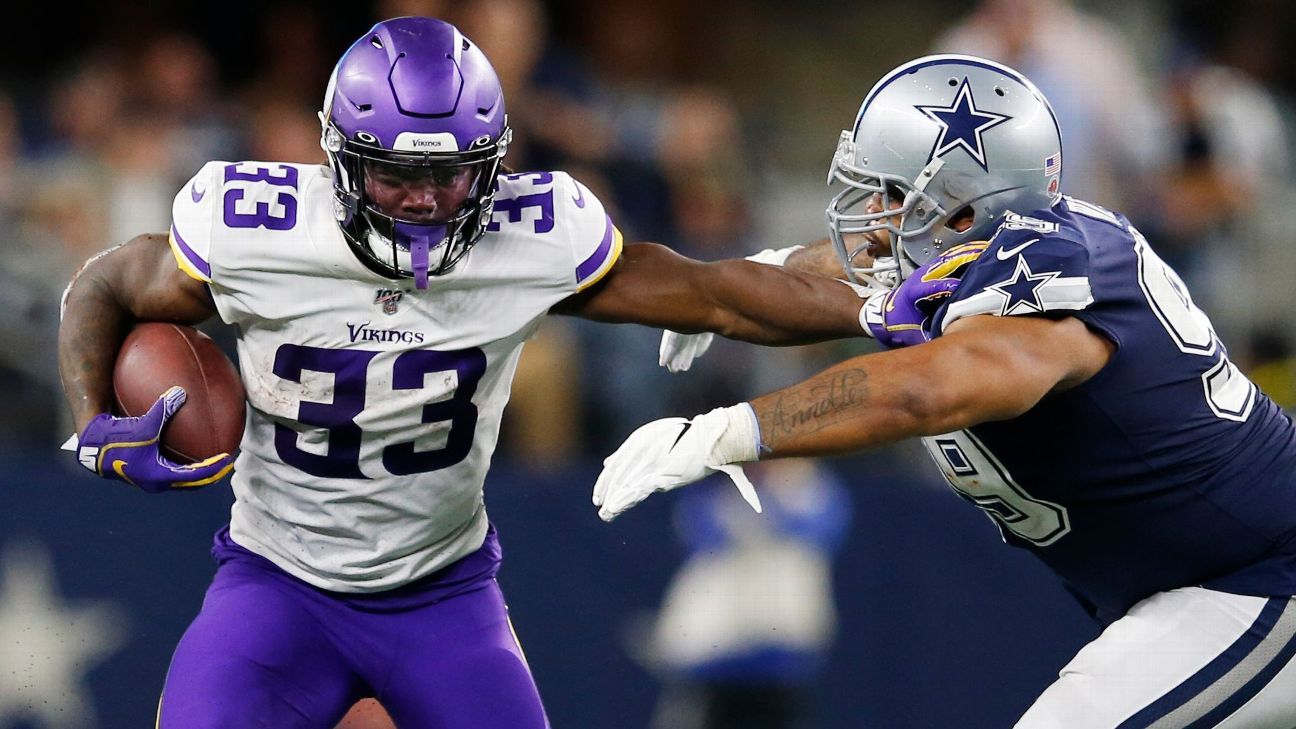MINNEAPOLIS — The waiting game has been going on for months. On Monday, Minnesota Vikings running back Dalvin Cook put his foot down.
A source told ESPN that Cook, who is set to make $1.33 million on the final year of his rookie deal, will no longer participate in any team-related activities until he receives a contract extension. Until this point, Cook had regularly attended the Vikings’ virtual offseason program.
With both sides at an impasse over what he should earn on his second contract, the wait continues. But it won’t go on forever.
Cook is the engine who makes Minnesota’s offense go. He has played 31 games in his career (including playoffs) and his production can be directly tied to the Vikings’ success over the past three seasons. Since 2017, Minnesota is 12-3 when Cook has at least 100 scrimmage yards in a game, and 6-9-1 when he has fewer than 100 yards, according to ESPN Stats and Information. He wants — and in many respects deserves — to be paid top running back money.
Though injuries have limited him to 29 games over the first three years of his career, Cook has proved his value as one of the top running backs in the NFL. The Vikings have built their offense around him. Last season, Minnesota used designed run plays on 47.4% of its offensive snaps, the second-highest figure in the NFL. Cook took 38.1% of the Vikings’ touches from scrimmage in 2019, the ninth-highest percentage in the league, and totaled 1,654 all-purpose yards and 13 rushing touchdowns in his first Pro Bowl season.
Cook developed into the centerpiece of the offense and became one of the most recognizable faces of the franchise. His charitable efforts in the Twin Cities ring true of a player who wants to be entrenched in the community for the long haul.
But Cook is headed for a holdout if a deal is not reached before training camp, although the Vikings have some history of signing players to extensions on the eve of camp. That’s the way they handled new deals for Stefon Diggs, Xavier Rhodes, Everson Griffen and Linval Joseph in recent years.
Negotiations have been taking place for a while. According to multiple league sources, the Vikings’ initial offer was below $10 million per year, which was not deemed “reasonable” by Cook and his representatives.
Minnesota has $12.295 million in available cap space, according to ESPN’s Roster Management. After the Vikings sign their rookie class, there will be approximately $8.13 million in cap space to allocate between Cook and safety Anthony Harris, who received the franchise tag.
Sources have suggested the initial figure proposed by Cook’s camp was close to the $16 million per year that Carolina’s Christian McCaffrey will make on his new deal. That number has dropped in recent negotiations to under $15 million, but neither side has yet to come to an agreement. Cook won’t top that and reset the market for a running back, but he still figures to earn megabucks on his next contract.
Negotiations are a result of both sides coming to the table, aiming high and settling in the middle. It takes time for terms to be hashed out, so the fact that there’s a stalemate shouldn’t incite panic.
It’s more reasonable to think the Vikings could offer the $13 million-per-year range given Cook’s value, injury history, their salary cap situation and the value of running backs in today’s NFL. That’s still top-five money at the position and would allow him to earn what Houston’s David Johnson is set to make in 2020. And it’s an offer sources say Cook would gladly take.
What if a deal doesn’t get done? According to a source, Cook is prepared to sit out the season and will not play during the final year of his rookie deal. But that won’t be to his advantage given new language in the CBA.
According to Article 8, Section 1 (b), “a player shall not receive an Accrued Season for any League Year in which the player is under contract to a Club and in which (i) he failed to report to the Club’s preseason training camp,” meaning Cook would not accrue a season and would be a restricted free agent after the 2020 season.
If that worst-case scenario happens, Minnesota could roll with second-year back Alexander Mattison and a committee that includes Mike Boone and Ameer Abdullah, who averaged a combined 4.9 yards per rush last season. The offense won’t have the firepower it does when Cook is in the backfield, but then again, Minnesota did give quarterback Kirk Cousins a two-year contract extension worth $66 million earlier this offseason. With that much money invested in one player, the Vikings have a right to demand a certain level of play from their quarterback.
There’s still time to get something done, but the Vikings will have to increase their initial offer considerably.
